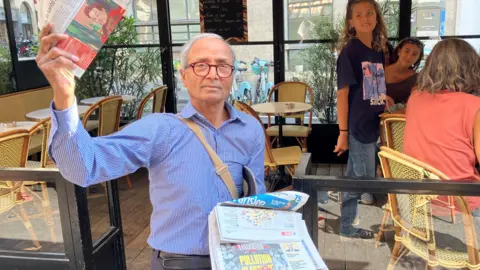In a remarkable acknowledgment of cultural legacy, France’s final newspaper hawker, Ali Akbar, is set to receive the prestigious Order of Merit from none other than President Emmanuel Macron. This honor carries significant weight, as it not only highlights Akbar’s long-standing contributions to French culture but also commemorates a unique profession that appears to be fading with the advent of digital media. Akbar, who has spent more than half a century selling newspapers on the iconic Left Bank of Paris, has become an emblematic figure in the city’s vibrant narrative, and his story encapsulates the challenges faced by traditional trades in a rapidly evolving society.
Ali Akbar’s journey began in 1973 when he first started selling newspapers in the streets of Paris. Back then, the streets were bustling with fellow hawkers, with about 35 to 40 individuals sharing the love of selling papers to customers. Today, he stands alone in this traditional vocation, illustrating a profound shift in how society consumes news. Akbar has expressed his dismay about the decline of his trade. “Everything is digital now. People just want to consult their telephones,” he lamented, illustrating a pervasive sentiment among the vanishing breed of newspaper hawkers. His current routine often involves peddling around 30 copies of Le Monde, a stark contrast to the days where he would sell upwards of 80 copies in just the first hour of publication.
Akbar’s heartfelt reminiscence of earlier times gives a glimpse into the cutting-edge culture of Paris that once thrived on printed publications. The atmosphere was rife with intellectual discourse, where paper sellers like Akbar interacted with a diverse clientele drawn from the bustling cafes of Saint-Germain. As he recalls fondly, “In the old days, people would crowd around me looking for the paper. Now I have to chase down clients.” This poignant observation speaks volumes about the societal transitions that have resulted in the decline of print media consumption.
Despite the declining sales, Akbar remains resilient and passionate about his work. He stands by the principle that joy is at the heart of his profession. “I am a joyous person. And I am free,” he asserts. There is a unique sense of independence in his words—he relishes the lack of restrictions that come with his job, portraying a romantic image of the newspaper vendor in a modern urban landscape increasingly reliant on technology.
The award ceremony recognizing Ali Akbar’s contributions is set against a nostalgic backdrop, where he is not only celebrated as a hawker but as a beloved fixture in the community. Many locals regard him as family, echoing the sentiments of affection and respect he has fostered throughout his career. One resident fondly remarked, “He is like a brother,” reinforcing the notion that Akbar is more than just a purveyor of papers; he is a cherished community member, deeply ingrained in the fabric of Parisian life.
His story is remarkably intertwined with notable figures and events in French history. Arriving in Europe from Rawalpindi in the late 1960s, Akbar’s voyage led him to the heart of Paris, where he encountered a myriad of celebrities from various fields, including political luminaries like President Macron, whom he assisted by providing newspapers during his university days.
As the last newspaper hawker in France—perhaps even in all of Europe—Akbar’s continued presence serves as a reminder of a bygone era. Although the weight of today’s modernity weighs heavily upon the traditional role he plays, he remains a beacon of passion and determination in a world profoundly changed by technology. His upcoming recognition with the Order of Merit is not just an award; it symbolizes the appreciation for a cultural icon whose story transcends the simple act of selling newspapers, reflecting a rich tapestry of history, change, and the enduring human spirit.











